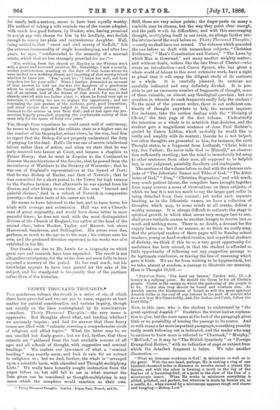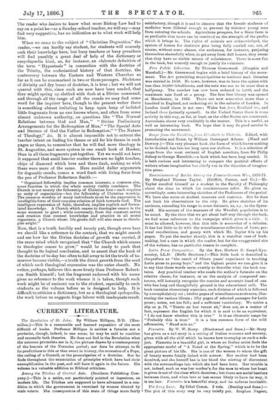THIRTY THOUSAND THOUGHTS.* Tam ponderous volume, the fourth in a
series of six, of which three have preceded and two are yet to come, suggests at least matter for painful consideration and curious inquiry, though not exactly on the lines contemplated by its conscientious compilers. Thirty Thousand Thoughts !—the very name is oppressive. But thoughts about what, and tending whither ? we anxiously inquire ; and find for answer that these heavy tomes are filled with "extracts covering a comprehensive circle of religions and allied topics." What the latter may be, we can unaided but dimly guess ; but we find, farther, that these extracts are "gathered from the best available sources of all ages and all schools of thought, with suggestive and seminal headings." We confess our ignorance of what a "seminal heading" may exactly mean, and look in vain for an extract to enlighten us ; but we find, further, the whole is "arranged upon a scientific basis, with classified and Thought-multiplying Lists." We really have honestly sought instruction from the pages before us, but still fail to see in what manner the lists given can be considered as thought-multiplying in any sense which the compilers would sanction as their own.
• Thirty Thousand Thoughts. London; Began Paul, Trench, and Co.
Still, these are very minor points ; the finger-posts on many a roadside may be clumsy, but the way they point clear enough, and the path worth its difficulties; and with this encouraging thought, multiplying itself in our brain, we plunge farther into
the intricacies of the work before us. Thirty Thousand Thoughts I —surely we shall have our reward. The volumes which preceded - the one before us dealt with tremendous subjects, "Christian Evidences," "Man's Constitution and Nature," "The Laws by which Man is Governed," and many another weighty matter;
and without doubt, writers like the late Dean of Chester—who wrote an introduction—and Canon Spence, who has given a whole world of labour to this most extensive work, have a right to plead that it will repay the diligent study of its contents as a whole. It is carefully planned, its sections are carefully indicated and very definitely divided. It is pos- sible to get an enormous number of fragments of thought, some of them valuable, on almost any theological question ; but our question is, wherein do such fragments really help the student ? To the mind of the present writer, there is not sufficient con- tinuity of thought anywhere to help the earnest inquirer. For instance, take the section dealing with the "Divinity of Cluist," the first page of the first volume. Undoubtedly the intention as a whole is to establish that doctrine, and the student gets a magnificent sentence of Jean Paul Richter's, quoted by Canon Liddon, which probably he would like to verify and amplify with its context ; therein he is not helped, but other thoughts are presented to him, for instance, the sixth Thought states, in a fragment from Luthardt, "Christ bids us say, Our Father ; He never calls God so Himself," an observa- tion sufficiently startling; but the mind is immediately led away to other sentences from other men, all supposed to be helpful, but, in our judgment, painfully desultory and inadequate.
The sections of the volume before us deal with the abstruse sub- jects of "The Jehovistic Names and Titles of God," "The Attri- butes of God," " Sins," "Christian Dogmatics," and with much, very much patient labour, the compilers have brought together from many sources a mass of observations on these subjects, of which we fear it is not too much to say the larger part suffer in being detached from their context; yet under each separate heading, as in the Jehovistie names, we have a collection of thoughts which may, to some minds at all events, deliver a worthy message. It is always difficult to estimate the stage in spiritual growth in which what seems very meagre fare to one, shall prove veritable manna to another, hungry to receive jest so much and nothing more. There is, no doubt, a demand for the supply before us ; but if we assume, as we think we justly may, that the principal readers of these pages will be Sunday-school teachers, young or hard-worked curates, and superficial students of divinity, we think if this be so. a very great opportunity for usefulness has been missed, in that the student is afforded so little opportunity of following out any suggestive passage to its legitimate conclusion, or tracing the line of reasoning which gave it birth. We are far from wishing to be hypercritical, but we take, almost at random, a passage to illustrate our meaning.
Here is Thought 10,802 :—
" The Lord my banner,' Exodus xvii., 15.—A.
banner is a rallying point. So should the Cross be for all Christ's people. Christ is the ensign to which the gathering of the people is to be. Under this they should be found and nowhere else. As Amalek smote the hindermost of Israel, so will the great spiritual Amalek strike at the soul of any loiterer in the path of service who does not bear His Cross boldly, and, like Joshua and Caleb, follow the Lord fully."
Now, in this case, who is the student to understand by "the great spiritual Amalek ?" Doubtless the writer had an explana- tion to give, but the mere name at the foot of the paragraph gives little or no possibility of tracing the passage to its source. And so with many a far more important paragraph, something possibly really worth following out is indicated, and the reader who may be anxious to know more is referred to" Charnock," "Murphy," " McCosh," or it may be "The British Quarterly" or "Foreign Evangelical Review," with no indication of page or subject from which the detached fragment is taken. We take another illustration :—
"What an immense workman is God! in miniature as well as in the great. With the one hand, perhaps, He is making a ring of one hundred thousand miles in diameter to revolve round a planet like . Saturn, and with the other is forming a tooth in the ray of the feather of a humming-bird, or a point in the claw of the foot of a microscopic insect. When He works in miniature everything is gilded, polished, and perfect, but whatever is made by human art, ae a needle, &c., when viewed by a microscope appears rough and coarse and bungling.—Bishop LAW.'
The reader who desires to know what more Bishop Law had to say on a point he—as a Sunday-school teacher, we will say—may find very suggestive, has no indication as to what work will help him.
When we come to the subject of "Christian Dogmatics," the reader,—we can hardly say student, for students will scarcely seek their knowledge here, but busy teachers or busy preachers will find possibly a great deal of help of the dictionary or encydoposdia kind, as, for instance, an elaborate definition of
the term " Hypostasis " in connection with the doctrine of the Trinity, the ecclesiastical history of that doctrine, the controversy between the Eastern and Western Churches 80 far as it can be summarised in two or three passages. Skeletons
of divinity and dry bones of doctrine, it is true ; but we will not quarrel with this, since such ere now have been needed, that they might spring up clothed with flesh at a Divine command, and through all the range of all the creeds we may find some word for the inquirer here, though to the present writer there is something almost irritating in heap upon heap of isolated little fragments from no one knows where, and often from some almost unknown authority, on questions like "The Normal Relations between God and Man," "Divine Preliminary Arrangements for the Redemption of Man," "The Special Acts ad Decrees of God the Father in Redemption," 'The Nature of Theology," 4S3c. It is almost impossible not to entreat the teacher intent on finding his theme or aid, for his theme in such pages as these, to remember that he will find more theology in St. Augustine, and more system in one small book of Hooker, than in all these fragments put together. Yet we would not have it supposed that amid heavier matter there are no light touches, chips of diamond which here and there flash, making us wish there were more of the same. Here amidst duller arguments for dogmatic creeds, comes a word fresh with living force from the pen of Professor Robertson Smith :—
"Organised fellowship implies common interests, a common aim, some function in which the whole society visibly combines. The Church is not merely the fellowship of Christian love—such requires no unity of organisation—but the fellowship of Christian worship. The common worship of many individuals must be the expression in intelligible form of their common relation of faith towards God. The intelligent expression of faith, therefore, implies explicit and formu- lated knowledge. A Church which ceases to theologise ceases in the same moment to grow ; while conversely, from the constant action and, reaction that connect knowledge and practice in all moral organisms, a Church whose life grows dull will also cease to theolo- gise aright."
Now, that is a truth forcibly and tersely put, though even here we should like a reference to the context, that we might search and see how far the Divine doctrine of growth was carried, if the same mind which recognised that "the Church which ceases to theologise ceases to grow," would be ready to push that thought to its logical conclusion, and to assert that the husk of the doctrine of to-day has often to fall away to let the truth of to- morrow become visible,—a truth the direct growth from the seed of which such theological expression was the outer sheath. No writer, perhaps, believes this more firmly than Professor Robert- son Smith himself; but the fragment endorsed with his name gives no reference to the work whence it is taken, though such work might be of eminent use to the student, especially to such students as the volume before us is designed to help. It is difficult to criticise a dictionary, but as a theological cyclopmdia, the work before us suggests huge labour with inadequate result.



































 Previous page
Previous page